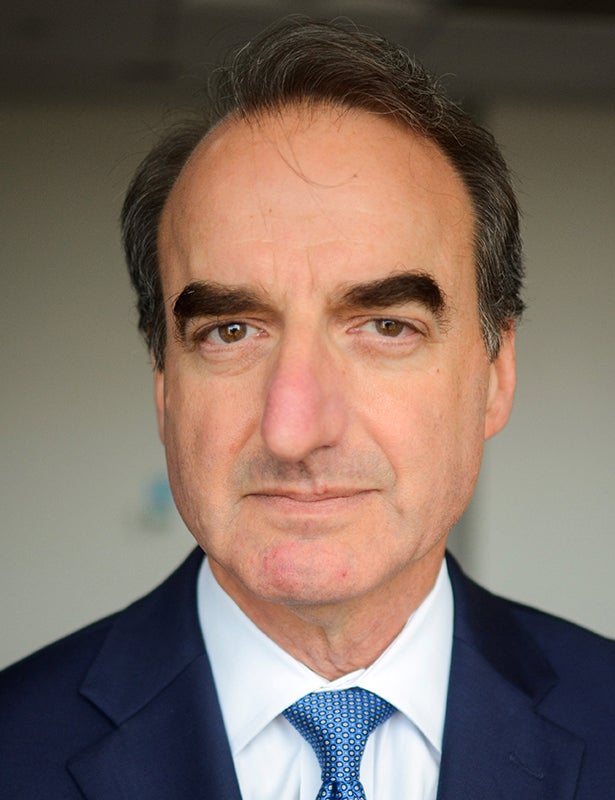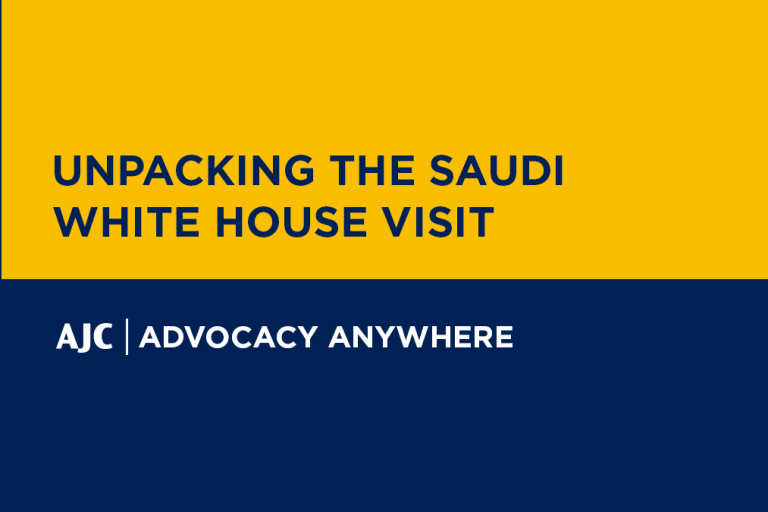November 8, 2017 — Brussels, Belgium
The remarks below were delivered at the European Parliament at an event co-sponsored by AJC's Brussels-based Transatlantic Institute. More than 150 Members of the European Parliament, diplomats, and guests attended.
Thank you for inviting me to join in this centenary celebration of the Balfour Declaration – a celebration of the practical wisdom of a war-time British Government, of the triumph of historical obligation over colonial expediency, of the long-delayed recognition of a people’s rightful inheritance. As a representative of the American Jewish Committee, an organization dedicated to assuring the well-being of the Jewish people and committed to a secure Israel expressing our people’s sovereignty in our historic homeland and assuming its natural role in regional and world affairs, I’m proud and pleased to celebrate.
But this is a moment not just for celebration but also for reflection – and for taking stock of the challenges that remain for the unambiguous acceptance of the “national home for the Jewish people,” in Lord Balfour’s phrase, in the region that gave birth to this ancient nation and more fully in the broader community of nations, and a time for taking stock of – and agreeing to decisively address – the security threats that continue to confront the Israeli people.
In some ways, of course, it can be said “acceptance” or “recognition” of Israel is a minor problem; the country, after all, has diplomatic relations with some 160 states. And how much does it really matter, when by any measure – economically, strategically, as the sought-after start-up nation, as a vibrant democracy with a notably independent judiciary – the remarkable success of Israel is abundantly clear?
In the same manner, one may ask how severe the threats to Israel’s security really are – when this small, even besieged, state has proven time and again throughout its almost 70-year history its reach and its effectiveness against foes near and far.
Please allow me to address first the issue of political acceptance – and allow me to get personal. From my first moments with AJC, more than 26 years ago, I have been engaged – as I know have many in this room – in the effort to achieve fair treatment of Israel in the community of nations
- AJC – and, in particular, my colleague David Harris, our CEO – played a leading role a quarter-century ago in challenging and overturning the infamous “Zionism is racism” resolution in the United Nations General Assembly, a moral stain on the world body that was adopted 42 years ago this Friday and repealed in December 1991.
- From the 1970s through the 1990s, AJC and sister organizations undertook intensive outreach efforts to break the so-called Arab boycott of Israel, working closely with successive U.S. administrations and allies in Congress to assure Washington’s commitment to the cause, and then succeeding in demonstrating to key nations – and Japan was a particular focus of our efforts – that trade with Israel was in their national interest, and that oil-producing states would not so cavalierly write them off as customers.
- Again, throughout the 1990s and early in the current century, AJC played a leading role in helping convince allied nations to admit Israel into the Western European and Others Group in the United Nations – a breakthrough, achieved with temporary status in New York in 2000 and permanent status system-wide 13 years later, in gaining full enfranchisement and the ability to compete for positions and seats throughout the UN, including – we very much hope – a rotating seat on the Security Council a little over a year from now.
- More recently, there have been efforts to attain observer status for Israel in the African Union – a goal blocked by a handful of states intent on denying the obvious benefits of Israel’s presence on the continent, its already significant contributions to security, agricultural efficiency, and water use. This is one of our current international advocacy goals, which I very much hope the member states of the European Union – nearly all of which have AU accreditation – will endorse.
Such skewed political contests continue to play out in other forums – including the Executive Board of UNESCO and that agency’s World Heritage Committee, where Israel’s cultural and religious patrimony is routinely ascribed second-class status, and in the UN Human Rights Council, where concerns about all of the world’s human rights problems are reviewed annually under one agenda item, while complaints about Israel’s adherence to human rights standards are singled out and treated under a separate agenda item.
Beyond multilateral platforms, the ongoing challenge to Israel’s acceptance is seen on college campuses, and in academic societies and certain labor unions, in Europe and the United States – where campaigns have been waged to defame and delegitimize Israel, to hold it to a different standard from that of other nations, to make this great liberal expression of a beleaguered people’s national aspirations somehow illiberal, and thus to ostracize the state, its institutions and its people.
These campaigns, carried out under the banner of Boycott, Divestment and Sanctions against Israel, pose a threat not to Israel’s security in any immediate, tangible sense. But they do pose a threat to natural interactions between scholars and students, and between Israeli and international political factions and civil societies, and they do pose a threat over the long term to public understanding and political support for the Middle East’s only true democracy – a democracy that is admittedly evolving and imperfect, but is robust, self-critical, and equipped with mechanisms for self-correction.
I want to avail myself of this opportunity, as we celebrate in this parliamentary hall the centenary of the Balfour Declaration and examine the challenges facing the state that is the embodiment of that declaration, to call on this body and the national governments represented here to take strong steps against the BDS movement – to make it clear that boycotts against the Jewish state are contrary to the values and the interests of Europe.
Other challenges to Israel as we embark on the second century of the Balfour era lie in the security dimension – in actuality, multiple security dimensions.
First, of course, are the external threats Israel faces – in particular, the threat posed by an authoritarian, theocratic Iranian regime that has declared the Jewish state its sworn enemy, is filling the political and geographic cracks and crevices of both Lebanon and Syria with the proxy army of Hezbollah and the Revolutionary Guard Corps, has provided what are estimated to be upwards of 100,000 rockets and missiles ready to target Israel from the north, and is steadily advancing its longer-range ballistic missile program as it counts down the years before it can be freed of restraints on enrichment that would enable it to produce the fuel for nuclear warheads.
On this point, I appeal to the European Parliament and to individual EU member states to send the clearest possible signal to Tehran that its aggression – toward Israel as well as toward its Sunni Arab neighbors – will not be tolerated, and will not be enabled through “business as usual” with the West. In this regard, I urge the European Union to join the United States, Israel, the Gulf Cooperation Council, and other bodies in fully designating Hezbollah as a terrorist organization. And I urge you, in the name of your own defense and of global peace and security, to make common cause with the United States in pursuit of strengthened sanctions on Iran’s missile program and other provocative behaviors, and in pursuit of permanent closure of Iran’s pathways to the bomb – through an amended Joint Comprehensive Plan of Action, if that course proves feasible, or through parallel undertakings.
A further external security threat, a further challenge to Israel 100 years after Lord Balfour’s decree, emanates from the same source that has brought a wave of terror and grief to Europe over more than a decade – the threat of Islamist extremism, a radical and violent perversion of a noble faith. Israel and Israelis abroad must ever be vigilant against Al Qaeda, Islamic State, and other militarized, vengeful zealots. The shared experience of confronting this menace to civilization unites Israel with Europe and America – and with all, especially in predominantly Muslim states themselves, who abhor the distortion and weaponization of Islam. Europe’s determination to stand with Israel against extremism – and to stand, as well, against intolerance and discrimination that make fertile ground for extremist recruitment – could not be more essential.
Finally, of course, there is the internal security threat Israel faces. A Palestinian population abused by revolutionary and corrupt leadership, sold a mythical history and an unobtainable vision of a land without Jews, and frustrated by political and economic paralysis has too often been prey to appeals to violence, leaving over the years a deadly toll of Israeli men, women and children – and making it ever harder to build trust and support on both sides for the compromises and risks necessary for a negotiated two-state solution, the only feasible, durable outcome to the Israeli-Palestinian conflict. Rather than discourage and condemn those who widen the rift between Israel and a future Palestine by committing acts of violence, the Palestinian leadership has ennobled them, has celebrated them, has called them martyrs, and has named schools and parks and plazas after them.
Worse, the PLO has paid them – providing generous stipends to the families of imprisoned terrorists and to those who died committing terrorist acts, essentially incentivizing violence. If we want – and we desperately do want – to create a climate, to build a culture that fosters peace, this practice has to stop. In the United States, AJC is leading a campaign to call attention to this outrage, and to urge our Congress to withhold certain designated funds to the Palestinian Authority until it ceases rewarding terror. Washington can’t do this alone. I strongly urge the European Commission and the EU member states that have been consistent supporters of Palestinian political rights and Palestinian economic development to join us – and other supporters of the so-called Taylor Force Act now before Congress – in drawing a line against PA-subsidized terrorism, and withholding funds equivalent to these substantial stipends until Ramallah changes course.
The challenges Israel faces 100 years after the issuance of the Balfour Declaration are considerable. Near and far, there are challenges to its legitimacy – challenges incapable of obscuring the admiration for the Jewish state so evident in much of the world, but nevertheless posing potential difficulty with key constituencies in the years ahead. And near and far, there are security challenges – challenges as yet unequal to the highly capable Israeli security establishment, but nevertheless bearing the potential to inflict misery – frankly, for both Jewish and non-Jewish Israelis, and for their neighbors – and, in the case of the Iranian threat, if insufficiently checked, the potential to cause catastrophe.
But the true story of Israel a century after the Declaration isn’t of its challenges. It is the story of a prophecy reclaimed, of a vision realized, of a dispersed and hounded people returned to their land – to the “national home” Lord Balfour declared. This is the story, this is the reality, we celebrate today. And as we – Europeans and Americans – celebrate, so do we pledge to help safeguard this reality for the generations to come.



